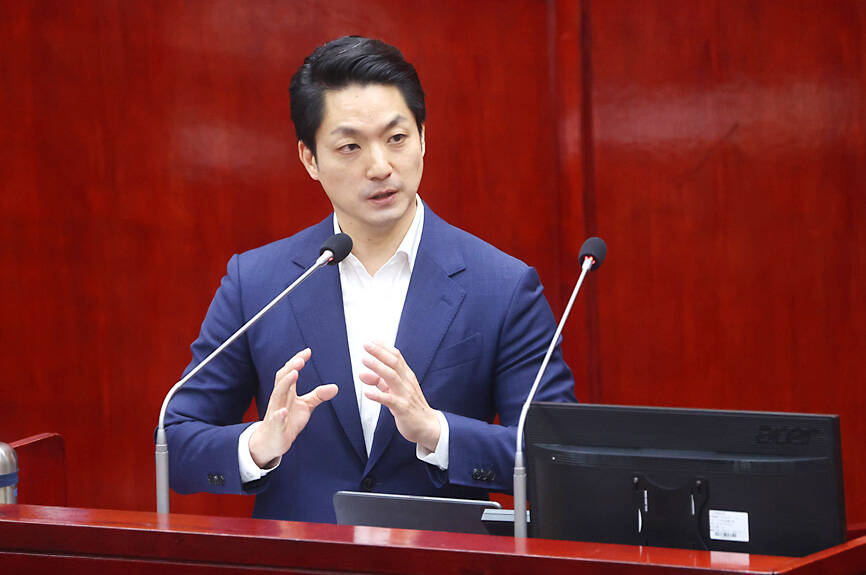Taipei Mayor Chiang Wan-an (蔣萬安) yesterday listed six flaws in EasyCard Corp’s Emerging Stock Market listing process, which was carried out in December last year before a change in municipal administration.
EasyCard Corp on Dec. 9 last year announced that its board had approved its plan to apply for listing on the Taipei Exchange’s Emerging Stock Market, only two weeks before then-mayor and Taiwan People’s Party Chairman Ko Wen-je (柯文哲) stepped down from his post on Dec. 25, with the corporation debuting on the stock market in January.
Saying that the Ko administration’s decision to list EasyCard appeared rushed and that it might dilute the government’s shares in the company, Chiang in June instructed city government officials to look into the case.

Photo: CNA
Reporting at the Taipei City Council yesterday, Chiang said the council found six flaws in the listing process:
‧ First, the company, which was operating normally and had abundant funding, did not follow the commercial practice of stating where the funds from the listing would be used or provide an operational or financial plan.
‧ Second, the company’s proposal stated that the city government would have a shareholding percentage of up to 74 percent; in reality, the government’s direct and indirect holdings combined totaled only 38.43 percent.
‧ Third, the company knew it would not be able to debut on the stock market during Ko’s term, but insisted on carrying out the listing, which is disrespectful of the new public opinion represented by the new mayor.
‧ Fourth, the Taipei Department of Budget had reminded the company about issues regarding the listing, but the listing was still approved, which disrespects professionalism.
‧ Fifth, the decision was reported to the city council through written documentation during a council recess, likely to avoid supervision.
‧ Sixth, it goes against political ethics and convention for a lame-duck government to continue pushing decisions when a new mayor has been elected.
While the investigation report states that the listing decision was made hastily and imprudently, and has several flaws, it did not find any illegally conduct, Chiang said.
To follow up on the issue, Chiang said he has asked the company to clarify its prospects and explain them to the public.
Democratic Progressive Party Taipei City Councilor Lin Yen-feng (林延鳳) said that a company lists on the Emerging Stock Market either to raise funds, increase brand awareness or prepare for listing on the mainboard, but EasyCard Corp does not meet any of these three purposes.
Chinese Nationalist Party (KMT) Taipei City Councilor Liu Tsai-wei (柳采葳) said that the EasyCard is widely used, associated with public interest and provides data for statistical analysis, but that the Ko administration casually made such a big decision only several days before the mayoral election, which appears ill-planned.
Social Democratic Party Taipei City Councilor Miao Po-ya (苗博雅) said that if the city government’s control over EasyCard Corp has dropped to less than 40 percent, Chiang’s administration should come up with a list of who was responsible for the decision.

Beijing could eventually see a full amphibious invasion of Taiwan as the only "prudent" way to bring about unification, the US Department of Defense said in a newly released annual report to Congress. The Pentagon's "Annual Report to Congress: Military and Security Developments Involving the People's Republic of China 2025," was in many ways similar to last year’s report but reorganized the analysis of the options China has to take over Taiwan. Generally, according to the report, Chinese leaders view the People's Liberation Army's (PLA) capabilities for a Taiwan campaign as improving, but they remain uncertain about its readiness to successfully seize

Taiwan is getting a day off on Christmas for the first time in 25 years. The change comes after opposition parties passed a law earlier this year to add or restore five public holidays, including Constitution Day, which falls on today, Dec. 25. The day marks the 1947 adoption of the constitution of the Republic of China, as the government in Taipei is formally known. Back then the Chinese Nationalist Party (KMT) governed China from Nanjing. When the KMT, now an opposition party in Taiwan, passed the legislation on holidays, it said that they would help “commemorate the history of national development.” That

Taiwan has overtaken South Korea this year in per capita income for the first time in 23 years, IMF data showed. Per capita income is a nation’s GDP divided by the total population, used to compare average wealth levels across countries. Taiwan also beat Japan this year on per capita income, after surpassing it for the first time last year, US magazine Newsweek reported yesterday. Across Asia, Taiwan ranked fourth for per capita income at US$37,827 this year due to sustained economic growth, the report said. In the top three spots were Singapore, Macau and Hong Kong, it said. South

Snow fell on Yushan (Jade Mountain, 玉山) yesterday morning as a continental cold air mass sent temperatures below freezing on Taiwan’s tallest peak, the Central Weather Administration (CWA) said. Snowflakes were seen on Yushan’s north peak from 6:28am to 6:38am, but they did not fully cover the ground and no accumulation was recorded, the CWA said. As of 7:42am, the lowest temperature recorded across Taiwan was minus-5.5°C at Yushan’s Fengkou observatory and minus-4.7°C at the Yushan observatory, CWA data showed. On Hehuanshan (合歡山) in Nantou County, a low of 1.3°C was recorded at 6:39pm, when ice pellets fell at Songsyue Lodge (松雪樓), a